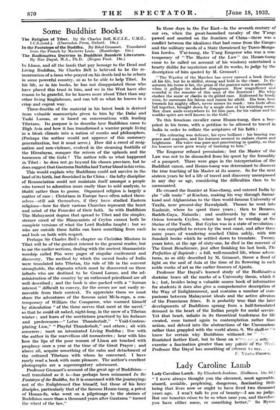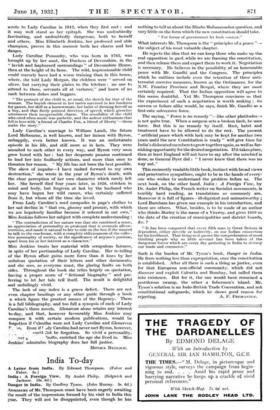Lady Caroline Lamb
Lady Caroline Lamb. By Elizabeth Jenkins. (Gollancz. lOs. 6t1.) " I HAVE always thought you the cleverest, most agreeable, absurd, amiable, perplexing, dangerous, fascinating little being that lives now or ought to have lived two thousand years ago. I won't talk to you of beauty—I am no judge. But our beauties cease:to be so when near you, and therefore you have either some, or something better." So Byron
wrote to Lady Caroline in 1812, when they first met ; and it may well stand as her epitaph. She was undoubtedly fascinating, and undoubtedly dangerous, both to herself and others. Miss Elizabeth Jenkins, her professed and able champion, proves in this memoir both her charm and her danger.
Lady Caroline Ponsonby, who was born in 1785, was brought up by her aunt, the Duchess of Devonshire, in the " lavish and haphazard surroundings " of Devonshire House, then at the height of its fame. The wild, impressionable child could scarcely have had a worse training than in this house, where, she told Lady Morgan, the children were " served on silver, but carrying their plates to the kitchen : no one to attend to them, servants all at variance," and knew of no rank between dukes and beggars.
"The portrait of the child is, as usual, the sketch for that of the woman. The boyish element in her tastes survived in her fondness for games, her skill as a horsewoman, her habit of dressing herself as a boy, and that finely pointed direction of speech which givesher utterances their inexpressible charm. The sensibility of the child who cried when music was pathetic, and the ardent enthusiasm that fell in love with a friend of Charles Fox, a friend of liberty '—theso make the story."
Lady Caroline's marriage to William Lamb, the future Lord Melbourne, is well known, and her liaison with Byron, unhappily, even better known. It was an unfortunate episode in his life, and still more so in hers. They were unsuited to each other in every way, and Byron very soon grew bored with her : but her desperate passion continued to lead her into foolhardy actions, and more than once to threaten her reason. " My life has not been the best possible. The slave of impulse—I have rushed forward to my own destruction," she wrote in the year of Byron's death, with the clear perception of her own character which rarely left her. She herself died four years later, in 1828, stricken in mind and body, but forgiven at last by the husband who may have begun her wild career, who certainly suffered from it, but whom all the time she loved.
From Lady Caroline's mad escapades in page's clothes to her sad decline in " that era, gloomy and prosaic, with which we are hopelessly familiar because it ushered in our own," Miss Jenkins follows her subject with complete understanding : " The contradiction of her nature was that she combined a sense, an appreciation of personality so profound that it overrode all con- ventions, and made it natural to her to ride on the box if she wanted to talk to the coachman, with a complete obliviousness of the collec- tive personality of society, or the significance of anyone's position, apart from his or her interest as a character."
Miss Jenkins treats her material with scrupulous fairness, in spite of her partisanship of Lady Caroline. Her re-telling of the Byron affair gains more force than it loses by her sedulous quotation of their letters and other documents, and she sees, as everyone must, the glaring faults on both sides. Throughout the book she relies largely on quotation, having a proper scorn of " fictional biography " and pre- ferring to let her tale tell itself. The result is delightful and unfailingly vivid.
The lack of any index is a grave defect. There are not even chapter headings or any other guide through a book n which figure the greatest names of the Regency. There is a full bibliography, and too full a synopsis of each of Lady Caroline's three novels. Glenarvon alone retains any interest to-day, and that, however favourably Miss Jenkins may compare it with certain modern publications, would be forgotten if Calantha were not Lady Caroline and Glenarvon r, on. Even if T Ay Caroline had never met Byron, however, vnold -Pot be forgotten. So vivid a personality,
.• 'ver g 'Mutts, enriched the age she lived in. Miss Jenkins' admirable biography does her full justice.
MONICA REDLICH.









































 Previous page
Previous page